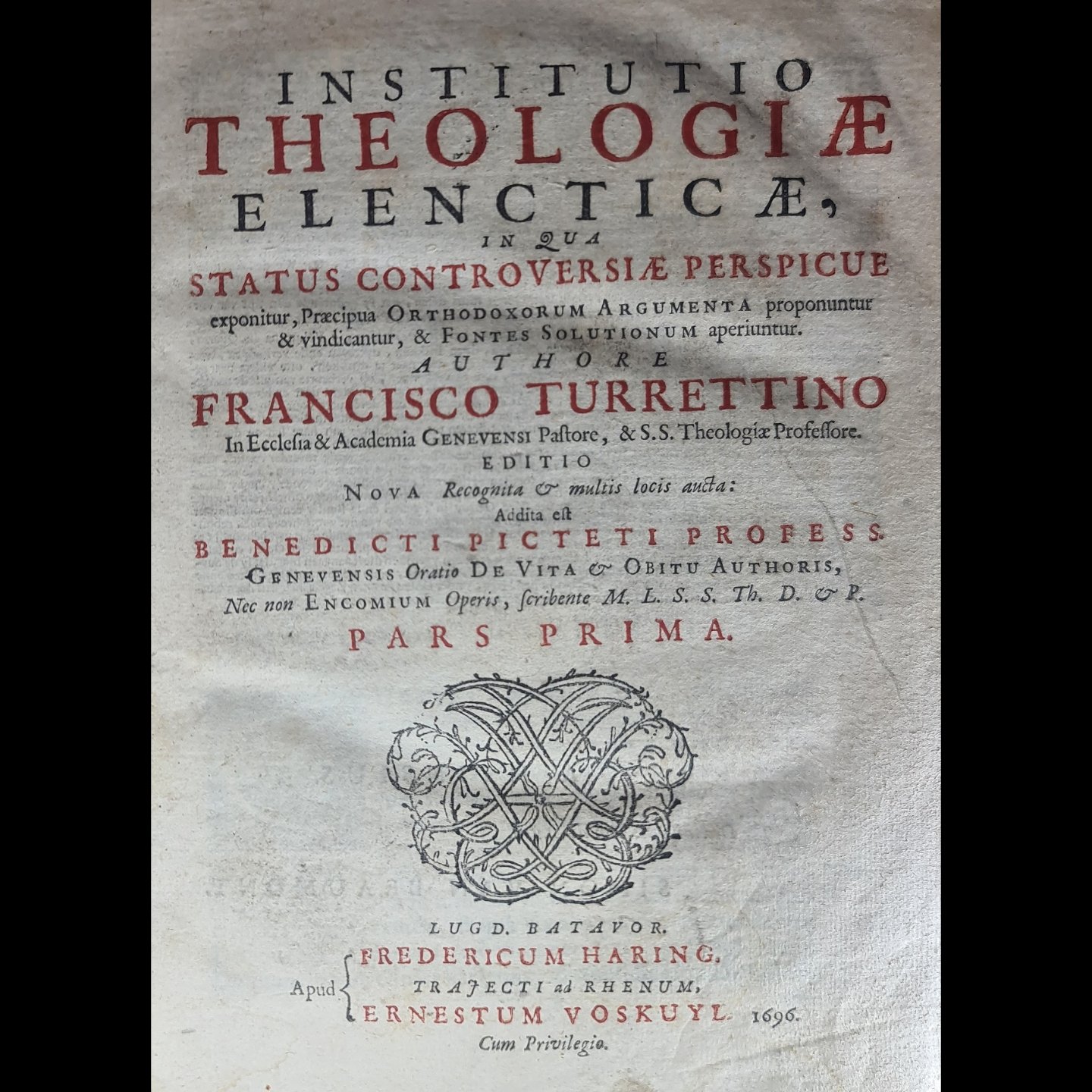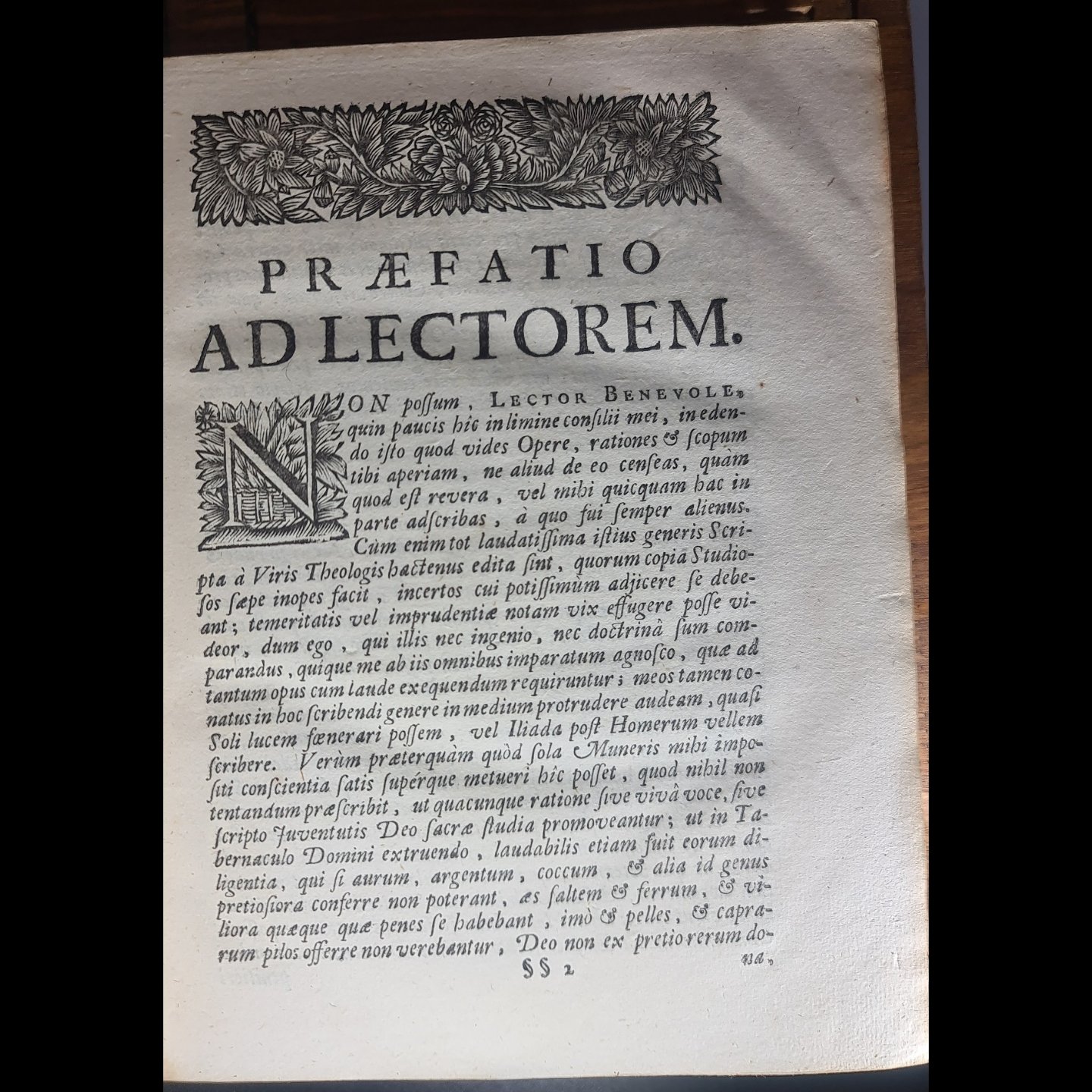 Image 1 of 19
Image 1 of 19

 Image 2 of 19
Image 2 of 19

 Image 3 of 19
Image 3 of 19

 Image 4 of 19
Image 4 of 19

 Image 5 of 19
Image 5 of 19

 Image 6 of 19
Image 6 of 19

 Image 7 of 19
Image 7 of 19

 Image 8 of 19
Image 8 of 19

 Image 9 of 19
Image 9 of 19

 Image 10 of 19
Image 10 of 19

 Image 11 of 19
Image 11 of 19

 Image 12 of 19
Image 12 of 19

 Image 13 of 19
Image 13 of 19

 Image 14 of 19
Image 14 of 19

 Image 15 of 19
Image 15 of 19

 Image 16 of 19
Image 16 of 19

 Image 17 of 19
Image 17 of 19

 Image 18 of 19
Image 18 of 19

 Image 19 of 19
Image 19 of 19




















1696 INSTITUTIO THEOLOGIAE ELENCTICAE, IN QUA STATUS CONTROVERSIAE PRESPICUE By FRANCISCO TURRETTINO Very Good Religion
1696 ,
INSTITUTIO THEOLOGIAE ELENCTICAE, IN QUA STATUS CONTROVERSIAE PRESPICUE
By FRANCISCO TURRETTINO
Illustrated By:
Format: Hardcover,
Language: Latin
Dust Jacket: No Jacket, Dust Jacket Condition: No Jacket
Published By: Fredericum Haring, Netherlands
octavo (8vo 6 × 9 152 × 229),Pages 756
ISBN:
1696 INSTITUTIO THEOLOGIAE ELENCTICAE [Institutes of Elenic Theology] Francisco Turretinno
Francis Turretin (17 October 1623 – 28 September 1687; also known as François Turrettini) was a Genevan-Italian Reformed scholastic theologian.
Turretin is especially known as a zealous opponent of the moderate Calvinist theology of the Academy of Saumur (embodied by Moise Amyraut and called Amyraldianism). He was an earnest defender of the Calvinistic orthodoxy represented by the Synod of Dort, and as one of the authors of the Helvetic Consensus, which defended the formulation of predestination from the Synod of Dort and the verbal inspiration of the Bible.
Institutio Theologiae Elencticae (3 parts, Geneva, 1679–1685) was an instance of Reformed scholasticism. The Institutes uses the scholastic method to dispute a number of controversial issues. In it he defended the view that the Bible is God's verbally inspired word. He also argued for infralapsarianism and federal theology. The Institutes was widely used as a textbook, up to its use at Princeton Theological Seminary by the Princeton theologians only to be replaced by Charles Hodge's Systematic Theology in the late 19th century. Of his other disputations, his most important are De Satisfactione Christi disputationes (1666) and De necessaria secessione nostra ab Ecclesia Romana et impossibili cum ea syncretismo (published in 1687). He wrote the Helvetic Consensus, a Reformed confession written against Amyraldianism, with J. H. Heidegger in 1675.
Turretin greatly influenced the Puritans, but until recently, he was a mostly forgotten Protestant scholastic from the annals of church history, though the English translation of his Institutes of Elenctic Theology is increasingly read by students of theology. John Gerstner called Turrettini "the most precise theologian in the Calvinistic tradition
SKU: BTETM0001897
Approximate Package Dimensions H: 12.5, L: 30, W: 25 (Units: cm), W: 2Kg
1696 ,
INSTITUTIO THEOLOGIAE ELENCTICAE, IN QUA STATUS CONTROVERSIAE PRESPICUE
By FRANCISCO TURRETTINO
Illustrated By:
Format: Hardcover,
Language: Latin
Dust Jacket: No Jacket, Dust Jacket Condition: No Jacket
Published By: Fredericum Haring, Netherlands
octavo (8vo 6 × 9 152 × 229),Pages 756
ISBN:
1696 INSTITUTIO THEOLOGIAE ELENCTICAE [Institutes of Elenic Theology] Francisco Turretinno
Francis Turretin (17 October 1623 – 28 September 1687; also known as François Turrettini) was a Genevan-Italian Reformed scholastic theologian.
Turretin is especially known as a zealous opponent of the moderate Calvinist theology of the Academy of Saumur (embodied by Moise Amyraut and called Amyraldianism). He was an earnest defender of the Calvinistic orthodoxy represented by the Synod of Dort, and as one of the authors of the Helvetic Consensus, which defended the formulation of predestination from the Synod of Dort and the verbal inspiration of the Bible.
Institutio Theologiae Elencticae (3 parts, Geneva, 1679–1685) was an instance of Reformed scholasticism. The Institutes uses the scholastic method to dispute a number of controversial issues. In it he defended the view that the Bible is God's verbally inspired word. He also argued for infralapsarianism and federal theology. The Institutes was widely used as a textbook, up to its use at Princeton Theological Seminary by the Princeton theologians only to be replaced by Charles Hodge's Systematic Theology in the late 19th century. Of his other disputations, his most important are De Satisfactione Christi disputationes (1666) and De necessaria secessione nostra ab Ecclesia Romana et impossibili cum ea syncretismo (published in 1687). He wrote the Helvetic Consensus, a Reformed confession written against Amyraldianism, with J. H. Heidegger in 1675.
Turretin greatly influenced the Puritans, but until recently, he was a mostly forgotten Protestant scholastic from the annals of church history, though the English translation of his Institutes of Elenctic Theology is increasingly read by students of theology. John Gerstner called Turrettini "the most precise theologian in the Calvinistic tradition
SKU: BTETM0001897
Approximate Package Dimensions H: 12.5, L: 30, W: 25 (Units: cm), W: 2Kg
1696 ,
INSTITUTIO THEOLOGIAE ELENCTICAE, IN QUA STATUS CONTROVERSIAE PRESPICUE
By FRANCISCO TURRETTINO
Illustrated By:
Format: Hardcover,
Language: Latin
Dust Jacket: No Jacket, Dust Jacket Condition: No Jacket
Published By: Fredericum Haring, Netherlands
octavo (8vo 6 × 9 152 × 229),Pages 756
ISBN:
1696 INSTITUTIO THEOLOGIAE ELENCTICAE [Institutes of Elenic Theology] Francisco Turretinno
Francis Turretin (17 October 1623 – 28 September 1687; also known as François Turrettini) was a Genevan-Italian Reformed scholastic theologian.
Turretin is especially known as a zealous opponent of the moderate Calvinist theology of the Academy of Saumur (embodied by Moise Amyraut and called Amyraldianism). He was an earnest defender of the Calvinistic orthodoxy represented by the Synod of Dort, and as one of the authors of the Helvetic Consensus, which defended the formulation of predestination from the Synod of Dort and the verbal inspiration of the Bible.
Institutio Theologiae Elencticae (3 parts, Geneva, 1679–1685) was an instance of Reformed scholasticism. The Institutes uses the scholastic method to dispute a number of controversial issues. In it he defended the view that the Bible is God's verbally inspired word. He also argued for infralapsarianism and federal theology. The Institutes was widely used as a textbook, up to its use at Princeton Theological Seminary by the Princeton theologians only to be replaced by Charles Hodge's Systematic Theology in the late 19th century. Of his other disputations, his most important are De Satisfactione Christi disputationes (1666) and De necessaria secessione nostra ab Ecclesia Romana et impossibili cum ea syncretismo (published in 1687). He wrote the Helvetic Consensus, a Reformed confession written against Amyraldianism, with J. H. Heidegger in 1675.
Turretin greatly influenced the Puritans, but until recently, he was a mostly forgotten Protestant scholastic from the annals of church history, though the English translation of his Institutes of Elenctic Theology is increasingly read by students of theology. John Gerstner called Turrettini "the most precise theologian in the Calvinistic tradition
SKU: BTETM0001897
Approximate Package Dimensions H: 12.5, L: 30, W: 25 (Units: cm), W: 2Kg
Very good - binding some rubbing, some browning to FEP, text block and binding strong and firm. Lovely copy
